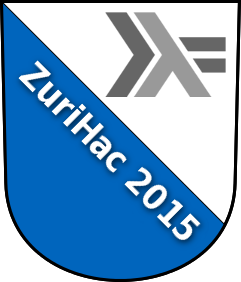Difference between revisions of "ZuriHac2015"
(Add a venue notice) |
(Link directly to Europlug wiki page. The section link can be confusing because it has "Schuko" right next to it, which will not work.) |
||
| Line 14: | Line 14: | ||
'''Important:'''<br> |
'''Important:'''<br> |
||
| − | Switzerland has [http://en.wikipedia.org/wiki/AC_power_plugs_and_sockets#Swiss_SEV_1011_.28Type_J.29 its own power sockets]. We can't provide converters for everybody so make sure to bring one along. Do note that the [http://en.wikipedia.org/wiki/ |
+ | Switzerland has [http://en.wikipedia.org/wiki/AC_power_plugs_and_sockets#Swiss_SEV_1011_.28Type_J.29 its own power sockets]. We can't provide converters for everybody so make sure to bring one along. Do note that the [http://en.wikipedia.org/wiki/Europlug Europlug] will fit in a Swiss power socket. |
|
|
||
Revision as of 08:47, 8 May 2015
| When: | Friday 29th of May 2015 - Sunday 31st of May 2015 |
| Where: | Google, Zurich, Switzerland |
Talks by  Edward Kmett and
Edward Kmett and  Duncan Coutts
Duncan Coutts
Important:
Switzerland has its own power sockets. We can't provide converters for everybody so make sure to bring one along. Do note that the Europlug will fit in a Swiss power socket.
About
On the last weekend of May 2015, the Zurich Haskell Meetup group will organize ZuriHac 2015, a three day Haskell Hackathon hosted at the Google offices.
This is the fourth Haskell Hackathon in Zurich. The previous three were ZuriHac2014, ZuriHac2013, and ZuriHac2010.
The Haskell Hackathon is an international, grassroots collaborative coding festival with a simple focus: build and improve Haskell libraries, tools, and infrastructure.
This is a great opportunity to meet your fellow Haskellers in real life, find new contributors for your project, improve existing libraries and tools or even start new ones!
This year, we want to have a special focus on beginners. During the whole event there will be beginners' mentors on site who you can directly approach at any time with any Haskell-related question you might have. Also, we will be having introductory talks for beginners, focusing on conveying experience that cannot simply be gathered by reading books or blog posts.
Sponsors
Google Switzerland hosts the Hackathon.
Venue notice
Visitors are not allowed to take any photos in the venue. No distribution of any Google work-related information visible inside the building. Visitors should always have a visitor sticker visible. Guests can not be left unattended.
News
- 10th of February 15
- Added wiki page
- 4th of March 15
- Registration is open
- 6th of March 15
- Duncan Coutts confirmed as second invited speaker; swapping days with Edward.
- 26th of March 15
- Edward Kmett announced his talk title
- 9th of April 15
- Confirmed beginners' talks
Registration
We have reached our maximum capacity. If you want to be queued into the wait list please still fill out this form: http://goo.gl/forms/L24NgFRvCw
If somebody cancels, we will fill up the seats from the wait list in first come first serve order. Please don't book anything before we have confirmed a seat for you.
Attendees
Here is the list of participants who have signed up for ZuriHac 2015 and have chosen their name to be listed there.
And here is the distribution of the expertise level of all of the participants:
| Beginner | Advanced | Expert |
|---|---|---|
| 51 | 49 | 20 |
45 participants offered to be a beginners' mentor for half a day (thank you!).
Location
Zurich, Switzerland
Here is a map with map with all important locations.
To learn more about the city, please see the Wikipedia and Wikitravel articles.
See here for public transport in the Zurich area.
A note on day tickets:
Day tickets in Zurich run for 24 hours and can be used on all forms of transport, bus, train, tram.
If you arrive via airplane, please note that the airport is outside of the zone 10, which only covers the city of Zurich itself. Since zone 10 counts double, you will need a ticket for 3 zones then.
You can buy tickets from the ticket machines.
Accommodation
We recommend the following accommodation options:
- http://www.langstars.com/en/ Youthhostel, CHF 50 per night.
- https://www.airbnb.com/ Airbnb, variable.
- Hotel Neufeld, http://www.hotel-neufeld.ch/.
Schedule
Please note, the schedule is still tentative.
| Friday | Saturday | Sunday | |
|---|---|---|---|
| 9am | doors open | doors open | doors open |
| 10am | opening ceremony & projects intro (*1) | ||
| 11am | Jannis Limperg, Monads by example (*4) | Gergely Risko, Template Haskell (*4) | Johan Tibell, Performance (*4) |
| 12pm | lunch snacks (*3) | lunch snacks (*3) | lunch snacks (*3) |
| 1pm | |||
| 2pm | Oliver Charles, Web programming (*4) | Mathieu Boespflug, Distributed programming (*4) | project summaries (*1) |
| 3pm | |||
| 4pm | Duncan Coutts | Edward Kmett, Discrimination is Wrong: Improving Productivity | |
| 5pm | |||
| 6pm | BBQ at the lake (*2) | doors close | |
| 7pm | |||
| 8pm | doors close |
Notes
(*1) If you are hosting a project, please be there to both introduce it and give a summary afterwards. Also, please add your project to the projects page.
(*2) Only if the weather permits it. Saturday same time will be the auxiliary date.
(*3) We will provide sandwiches or similar snacks for you. Because of limited budget we cannot serve a real lunch meal. Of course you can go to a local grocery shop and bring food and drinks with you.
(*4) Beginners' track; Those talks will happen in a separate area, so if you don't want to attend you won't be disturbed.
Talks
Edward Kmett
Title: Discrimination is Wrong: Improving Productivity
Abstract: This talk is a case study in library design in Haskell.
Fritz Henglein has shown through a number of excellent papers how to use "discrimination" to do lots of things in O(n): Sorting many more data types than you'd expect, table joins, etc.
In the process of optimizing this approach and wrapping it up in a form that can be easily consumed, we'll take a lot of detours through the different ways you can think about code when optimizing Haskell.
- We'll need some category theory, from a deeper understanding of monoids to Day convolution.
- We'll need to consider final and initial encodings.
- We'll need to drift down to low level system concerns from building a custom foreign prim to nesting unsafePerformIO within unsafePerformIO.
- We'll need properties of laziness from productivity to IVars.
Along the way we'll find and fix a small problem with the initial discrimination paper, which opens the door to streaming results, rather than having to wait until all the input is ready.
Duncan Coutts
Title: TBD
Abstract: TBD
Jannis Limperg
Title: Monads by example
Abstract: The Monad type class is used extensively in both the Haskell standard library and numerous third-party libraries for all sorts of domains. Yet, it is also one of the most infamous roadblocks for Haskell beginners, which this talk aims to address.
In order to build an intuition for what a Monad 'is' and especially for how it's useful in everyday programming, we will take a look at several important instances of the Monad class from the standard library (and the de-facto standard transformers package): Maybe, Either, [], State and IO. The examples will focus for the most part on how these very different types are all instances of the abstract concept of a Monad, and how using this abstraction and the associated syntactic sugar (do notation) can lead to cleaner, more readable code. Afterwards, we will take a look at how the Monad class is defined by a set of simple laws that every Monad instance must obey. Time permitting, we may also touch upon slightly more advanced topics such as Monad transformers and how Monads are related to Functors and Applicative Functors.
Prerequisites: LYAH up to and including chapter 8 (or of course anything else that covers the same topics). In particular, a basic understanding of algebraic data types and type classes is essential.
Oliver Charles
Title: Web Programming
Abstract: TBD
Gergely Risko
Title: Template Haskell
Abstract: Template Haskell is the meta programming extension for GHC. In this talk we will investigate and livecode some basic concepts of code generation and code introspection provided by this facility. We will also take a look on an example: the hflags command line parsing library.
Mathieu Boespflug
Title: Distributed Programming
Abstract: TBD
Johan Tibell
Title: Performance
Abstract: Production quality code not only needs to compute the correct result, but needs to do so within some given resource constraints (i.e. time and memory). We'll look at the most common optimizations you can use to make your Haskell code perform better and some rules of thumb you can use in your daily Haskell programming to avoid some performance problems "by design".
Projects
See the projects page.
Communication
If you have any questions before the event, please reach out to Alexander Bernauer <acopton@gmail.com> or Gleb Peregud <gleber.p@gmail.com>. If you are a confirmed participant, you will receive update emails from Alex as well.
Before the event, and in particular during the event, you can find us and other participants on irc://freenode.net/#zurihac. In addition, feel free to post on Twitter and Google+ using the hashtag #zurihac.
Organizers
The events are organized in name of the Zurich Haskell meetup group by the following people:
- Gleb Peregud (Google)
- Alexander Bernauer (Google)
- Johan Tibell (Google)
- Simon Meier (IBM Research)


